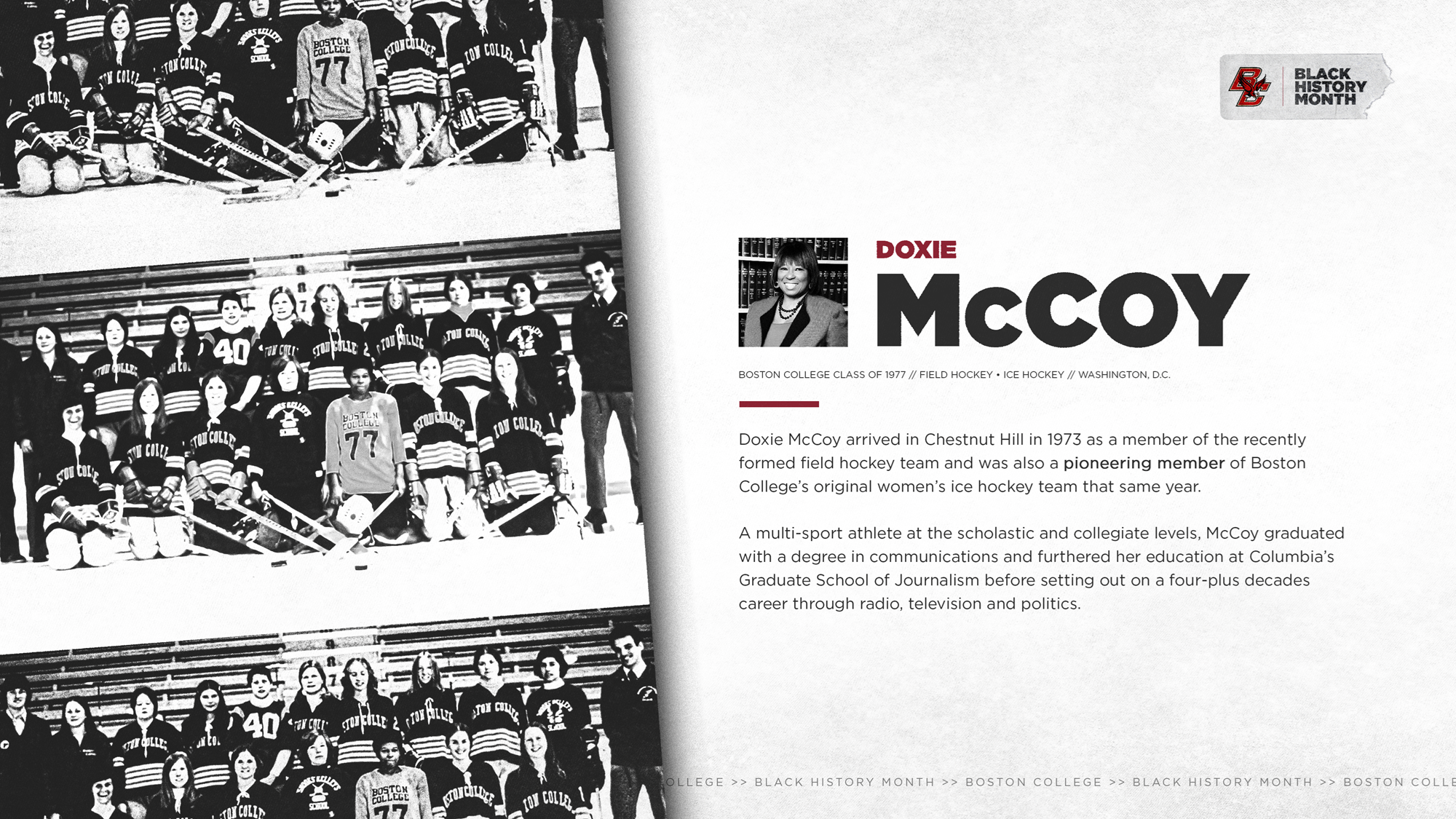THE McCOY FILE
Boston College Class of 1977
Field Hockey • Ice Hockey
Washington, D.C.
The passing of Title IX in 1972 began to open doors to women on college campuses that were previously afforded only to their male counterparts. Doxie McCoy arrived in Chestnut Hill in 1973 as a member of the recently formed field hockey team and was also a pioneering member of Boston College’s original women’s ice hockey team that same year. She also worked as a sports writer for The Heights and was the founding editor-in-chief of Collage; BC’s Black and minority newspaper that ran from 1977 to 1979. A multi-sport athlete at the scholastic and collegiate levels, McCoy graduated with a degree in communications and furthered her education at Columbia’s Graduate School of Journalism before setting out on a four-plus decades career through radio, television, and politics.
Doxie McCoy: If not me, then who?
Doxie McCoy ’77 understands the importance of representation as well as anyone. There is no official record of the first Black female athlete at Boston College, but it very well could be McCoy. BC only became a fully coeducational institution in 1970, Title IX was passed in 1972, which expanded opportunities for women in athletics, and McCoy was a member of the field hockey team beginning in the fall of 1973 as a freshman.
Born and raised in Washington, D.C. and attended an all-girls Catholic high school, McCoy was accustomed to being in the minority as one of the few Black students in her school.
“Representation is certainly important because it opens doors,” stated McCoy. “It opens doors for people who come behind you.”
McCoy chose to attend BC after looking at several schools in the Boston area, but ultimately committed to spending four years on the Heights due to the quality of the school’s communications program. She played field hockey for the Eagles and was recruited by former men’s hockey coach Snooks Kelly to join the upstart women’s program; despite not initially knowing how to skate.
Opportunities for women in sports began to grow and McCoy was an example of a woman willing to take chances in a changing world.
“I think it was a slow build,” McCoy said of the impact Title IX had on college campuses. “It reached beyond just ice hockey and not just at Boston College, but nationwide. Women’s sports were just, they were not taken that seriously and funded like the men’s sports were. It’s a reflection of society at the time, in terms of pushing for women’s rights and women’s liberation, and so sports were kind of folded into the same thing.”
On the heels of the Civil Rights Movement, the city of Boston and the Boston College campus were slowly progressing. In the 1970s, the city was dealing with desegregation of public schools and forced bussing, while BC students pushed for the admittance of more Black and minority students.
Beginning in 1968 and in place through most of the 1970s, BC’s Black Talent Program sought to recruit Black students to the university. The program was initially successful but was also seen as a tool to keep a limit on the number of Black students admitted to BC, which caused students to protest against the administration in an effort to expand the number of slots for Black students in each class.
“Now, I know that I do recall that there were protests on campus because the Black students were trying to get more slots to have more Black students admitted to Boston College as it were, at other universities,” recalled McCoy. “I did participate in some of those protests trying to get the school administration to increase their population of Black students.”
Humans Not Things
It’s that time again
Sororities and Fraternities
When some people forget PEOPLE
And treat them like things.
Think, is it all worth it
Humiliation and Degradation
Does it really help, or
Disturb the situation?
And when you sport those colors,
Whatever they may be
Wouldn’t it be nice
To say others thought twice
And remembered you were a
HUMAN BEING
Doxie McCoy (Collage – Jan. 1977)
McCoy increasingly became an involved member of the student community, expanding beyond athletics, during her time at BC. While focusing on her communications course work, she became a sports reporter for The Heights and founding editor-in-chief of Collage, the campus’s Black student newspaper.
Through those avenues, McCoy became a thoughtful voice for Boston College’s underrepresented student population. In the first issue of Collage, published in January 1977, her poem ‘Humans, Not Things’ was printed in a page three-section dedicated to original works submitted by BC students. Three months later in her final issue, McCoy offered a letter ‘From The Editor’s Desk’, which called out BC’s dismantling of the Black Talent Program and called for a unification of BC’s student minorities in an effort to “help those who help you”.
“When I came to Boston College, I was used to being in the minority,” said McCoy. “But by the same token, I was never held back in terms of pursuing the things that I wanted to do. Because I thought, if not me, then who will? I’ve never been afraid to try to break barriers and encourage any student who feels like they can contribute and feel like if they’re the only one then don’t be afraid to be the only one because we need the first only one.”
Forty-four years since graduating from Boston College, McCoy has witnessed other women rise up and break barriers; in particular in her hometown of D.C. A member of Alpha Kappa Alpha’s city chapter in Boston during her time at BC, McCoy is proudly a part of the same sorority that Vice President Kamala Harris pledged as an undergraduate at Howard University in the 1980s. Last month, Harris became the living embodiment of McCoy’s need for “the first only one” when she was sworn in as the 49th Vice President of the United States; the first woman, first African-American, and first Asian-American to hold the office.
Every pioneer needs someone in their corner pushing them every step of the way and at the end hopes to look back to see a growing crowd in pursuit on their path. For McCoy, the support came from her parents Shelbie and Samuel.
“Both of them excelled in education and excelled in their professions,” McCoy said of her parents. “D.C. is a government town. My dad worked for the federal government. He worked for the Department of Commerce and NOAA (National Oceanic and Atmospheric Administration). He was one of the very few Black scientists and oceanographers in that agency. So I would say my parents always pushed my sisters and I was not afraid to break barriers.”
That’s the lasting message the former editor-in-chief leaves behind to those who have pursued her path; do not be afraid.
Author Profile
Latest entries
 ACCMarch 14, 2024BC to Play 12th Annual ALS Awareness Game at Fenway Park
ACCMarch 14, 2024BC to Play 12th Annual ALS Awareness Game at Fenway Park ACCMarch 3, 2024Eagles Fall in Home Finale to Pittsburgh
ACCMarch 3, 2024Eagles Fall in Home Finale to Pittsburgh ACCFebruary 10, 2024Boston College Names Bill O’Brien Head Football Coach
ACCFebruary 10, 2024Boston College Names Bill O’Brien Head Football Coach ACCJanuary 28, 2024Another Season Sweep of the Irish as BC wins 61-58
ACCJanuary 28, 2024Another Season Sweep of the Irish as BC wins 61-58






